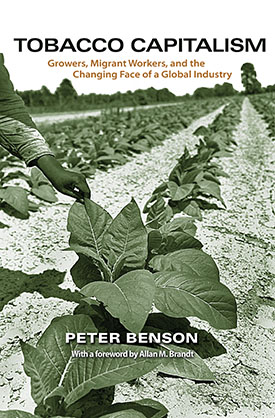If Republican senators from tobacco-growing southern states believe in social responsibility, they would fully explore the TransPacific (TPP) trade agreement’s potential impact on countries around the world — including provisions that influence the ability of American tobacco corporations to flood the globe with cheap, cancer-causing cigarettes — suggests the author of a book on the history, social costs and global politics of the tobacco industry.

“One of the great paradoxes of tobacco,” said Peter Benson, PhD, associate professor of anthropology in Arts & Sciences at Washington University in St. Louis, “is that while the U.S. government and public health community became increasingly aware of the harms of tobacco, the trade wing of the American government has been busy fighting for the expansion of new markets in the developing world, where they want people to purchase American-made cigarette products, like Marlboros.”
Benson, the author of “Tobacco Capitalism: Growers, Migrant Workers, and the Changing Face of a Global Industry” (Princeton University Press, 2012), has conducted years of research on the industry, including months working alongside farmers and migrant workers in the tobacco fields of North Carolina.

His book explores the shifting role of U.S. tobacco growers in an industry grown increasingly global over the last half century.
In recent decades, he notes, American tobacco companies have sent U.S. tobacco farms into crisis by aggressively switching to cheaper foreign tobacco sources, while coaching U.S. growers to blame the state, public health and minorities for the financial hardship and vilification often felt by the growers.
In a recent podcast, Benson discusses the industry’s history of using international trade agreements and corporate responsibility campaigns to subvert anti-tobacco health initiatives and continue marketing tobacco in developing countries where demand is still growing.
“The American Chamber of Commerce has been advocating on behalf of tobacco companies for the TPP because what the TPP would allow — just like the historical pattern would predict — is the influx of Marlboro cigarettes into countries in Southeast Asia, lower tariffs, lower taxes on American-made cigarettes, etc.,” Benson said. “So tobacco companies really stand to gain a lot from TPP and the further globalization of tobacco products hinges on the continued American support for free trade agreements like the TPP.”
Given these concerns, world health officials lobbied hard to “carve-out” an exclusion for tobacco products in the TPP agreement announced this week, a caveat that prevents American tobacco companies from using the agreement to file lawsuits blocking anti-smoking public health initiatives within the 12 participating countries.
Several Republican congressmen, including Majority Leader Sen. Mitch McConnell (R-Kentucky), are raising concerns about the tobacco carve-out and threatening to prevent its approval in Congress. While they contend the tobacco carve-out sets a bad precedent for limits on other U.S. agricultural products, some suspect the real concern is a possible loss of votes in southern states with a strong tobacco-industry influence.
“Everyone knows that smoking is dangerous and at a time when corporations, including tobacco companies, push how socially responsible and transparent they are, pushing a dangerous product in developing countries seem hypocritical at best,” Benson said.
Benson’s research explores how tobacco corporations have adopted social responsibility platforms to improve their public image and shift liability for smoking-related health risks on to parents, families and communities. To smoke or not, they argue, should be a choice left to informed adults.
“Philip Morris spends a lot of time talking about parental responsibility, because if parents are responsible for talking to their kids about smoking, it lets Phillip Morris and government regulators off the hook.
“If your kid starts smoking, it’s really you’re fault, right?”
It’s astonishing, Benson said, that the tobacco industry is allowed to continue profiting from the global marketing of a product clearly shown to cause health problems and mortalities. America’s mediocre response to tobacco and this notion that smoking is an adult choice has helped the tobacco industry to stay in the game and be strengthened, he argues.
“We’re talking about an industry that for a century has been negligent and corrupt and has been litigated against and been found to be criminal and wrongful and deceitful, but it’s still around and it’s very profitable and being globalized in a way that’s maybe more harmful than ever,” he said.
“It’s astonishing to me that this is how it’s played out, because other chemicals, like lead, are not around anymore. Asbestos is not around anymore. Asbestos is not an informed adult choice. Getting lead in your paint or your gasoline is not an adult choice, so I wonder why it is that tobacco remains an adult choice.”